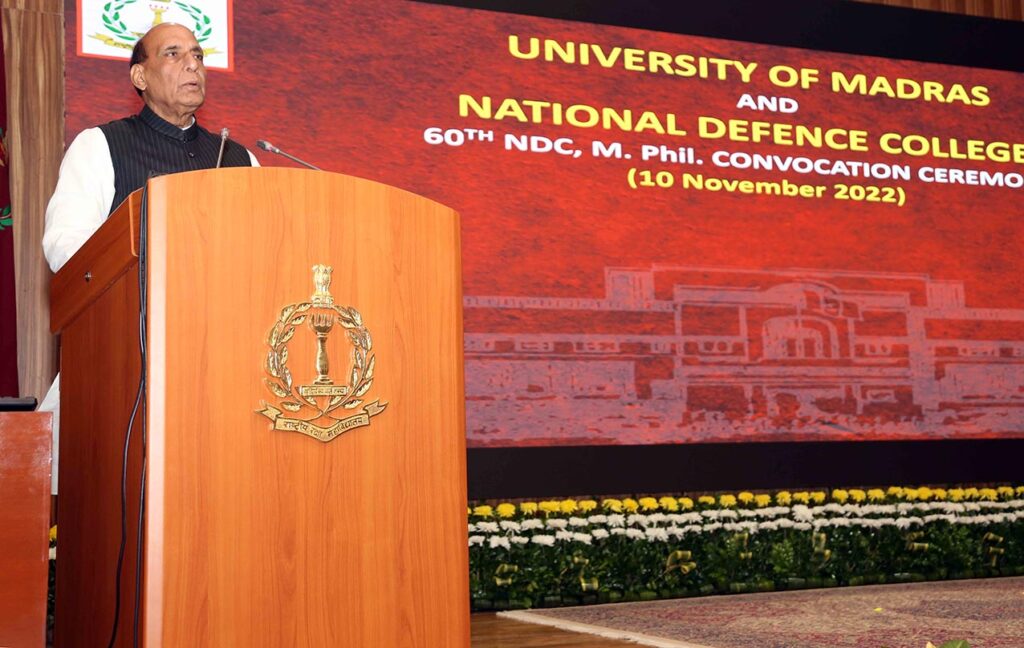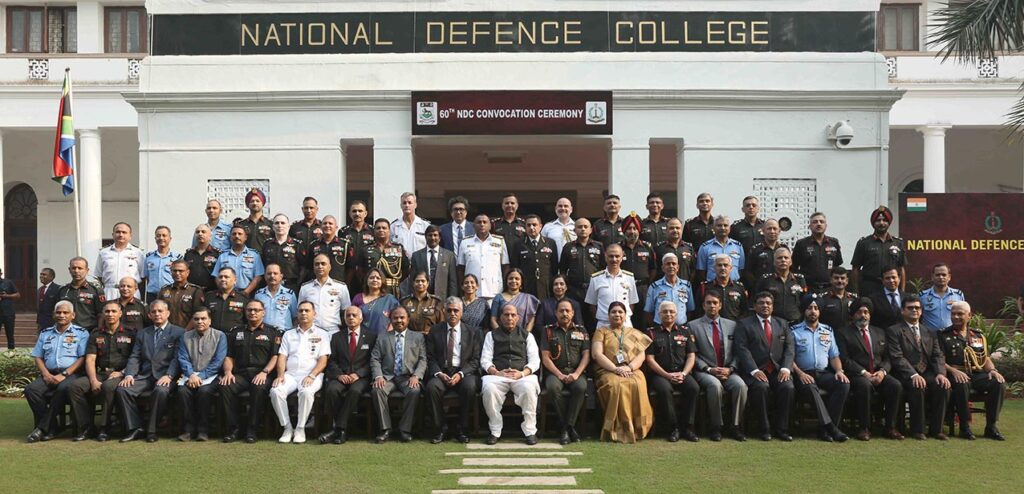Gap between internal & external security narrowing, concerted international efforts needed to counter emerging threats like cyber-attacks & information warfare: Defence Minister to graduating officers of 60thNational Defence College course in New Delhi
- Calls to consider national security as a truly collective enterprise, not as a zero-sum game for a global order beneficial to all
- India believes in a multi-aligned policy, not a world order where few are considered superior to others, says Mr. Rajnath Singh

New Delhi, November 10. Defence Minister Rajnath Singh has called for concerted efforts of the international community to counter “grave” emerging security threats such as cyber-attacks and information warfare. He was addressing the officers of the Indian Armed Forces, Civil Services as well as from friendly foreign countries during the 60th National Defence College (NDC) course convocation ceremony in New Delhi on November 10, 2022.He termed national security as the prime focus of the Government, led by Prime Minister Narendra Modi, stressing that the full potential of the country can be tapped only when its interests are protected. Security is sine-qua-non for civilisation to flourish and prosper, he said.
Mr. Rajnath Singh threw light on the narrowing gap between internal and external security and said that new dimensions of threats are being added with changing times, that are difficult to classify. He asserted that terrorism, which generally falls into internal security, is now classified in the category of external security, as training, funding and arms support of such organisations is being carried out from outside the country.
Describing the vulnerability of critical infrastructure to cyber-attacks as a big concern, Defence Minister said, sectors such as energy, transport, public sector services, telecommunications, critical manufacturing industries and interconnected financial systems are prone to such threats. He was of the view that information war has the potential to threaten the political stability of a country. He pointed out that the organised use of social media and other online content generation platforms is engineering the opinion and perspective of the masses.
“The deployment of information war was most evident in the ongoing conflict between Russia and Ukraine. Throughout the conflict, social media has served as a battleground for both sides to spread competing narratives about the war and portray the conflict on their own terms. The propaganda campaigns as a means of strategy to shape narratives are by no means new during warfare, but its reach has increased by leaps and bounds due to the shift toward social media as the primary distribution channel,” said Mr. Rajnath Singh.
Quoting Martin Luther King Jr, Defence Minister stated that “Injustice anywhere is a threat to justice everywhere”. He emphasised that when peace and security of any region is threatened, the entire world feels its impact in multiple ways. “The recent Ukrainian conflict showed how its ripple effects could adversely impact the whole world. Together, Russia and Ukraine export nearly a third of the world’s wheat and barley, but this conflict had prevented grain from leaving the ‘breadbasket of the world’ and led to food crisis in various African and Asian countries. The conflict has also fuelled an energy crisis in the world. In Europe, oil and gas supply has been dwindling. India has also been affected as the Russia-Ukraine war led to a disruption in international energy supply, making the energy import much more expensive,” he said.

Mr. Rajnath Singh stressed the need to consider security as a truly collective enterprise, which can create a global order beneficial to all. “National security should not be considered a zero-sum game. We should strive to create a win-win situation for all. We should not be guided by narrow self-interest which is not beneficial in the long-run. We should be guided by enlightened self-interest which is sustainable and resilient to shocks,” he said. Defence Minister added that while many multilateral organisations, such as United Nations Security Council, are working in the field of security, there is a need to elevate it to a level of shared interests and security for all.
Referring to the global response to the Covid-19 pandemic, Defence Minister said, it highlighted the urgent requirement of multi-national collaboration in information sharing, situational analysis, as also research, development and production of the vaccine. It highlighted the need for greater understanding, connect and cooperative initiatives between institutes and organisations within and across nations to handle issues of national and international security, he said.
Mr. Rajnath Singh affirmed India’s belief in a multi-aligned policy, realised through diverse engagements with multiple stakeholders, so that the concerns of all can be addressed for a prosperous future. He termed it as the only way that can lead to shared responsibility and prosperity.
“Strong and prosperous India would not be built at the cost of others, rather, we believe in helping other nations to realise their full potential. India does not believe in a world order where few are considered superior to others. Our actions are guided by the very essence of human equality and dignity, which is a part of its ancient ethos and strong moral foundations. Real politik cannot be the fig leaf for being immoral or amoral. Rather, enlightened self-interest of nations can be promoted within the framework of strategic morality, which is predicated on the understanding and respect for the legitimate strategic imperative of all the civilised nations. It is for this reason that when we partner any nation, it is on the basis of sovereign equality and mutual respect. Forging relations comes naturally to India, as we work towards mutual economic development,” Defence Minister said.
Congratulating the officers from foreign countries for completing the course, Mr. Rajnath Singh termed them as a bridge between India and the world. He exuded confidence that the course will pave the way for enhancing global security and prosperity. He added that the officers, who have completed the course, will be well equipped to not only handle all future challenges, but will also be able to synergise all elements of national power in a collaborative manner with other stakeholders of national security.
Defence Minister appreciated how the NDC has been instrumental in fostering indigenous strategic thought and grooming generations of strategic leaders, thinkers and practitioners not only from India but also from abroad. He lauded NDC’s sustained efforts to stay abreast of developments in the global security landscape.
During the convocation ceremony, eighty officers from the 60th NDC Course (2020 batch) were awarded the prestigious MPhil degree from the University of Madras. Mr. Rajnath Singh awarded the parchments to the graduating officers. The NDC’s flagship ‘National Security and Strategy’ course, using a comprehensive pedagogical model, is conducted over a 47-week duration. The award of the MPhil degree from Madras University is a concurrently running programme for volunteer officers during the course.
In his address, Commandant NDC, Lt Gen MK Mago stated that the officers of the 60th NDC course would be able to apply a trans disciplinary and out-of-the-box approach to national issues at the strategic level, both in policy formulation and execution.He highlighted NDC’s vibrant academic environment, which in addition to fulfilling its mandate, has inspired many course participants to pursue PhDs/original research in Defence Studies.
Defence Secretary Mr. Giridhar Aramane, Vice Chancellor, University of Madras Prof (Dr) S Gowri and other distinguished guests were present on the occasion. The NDC was established in 1960. Considered the highest school of strategic learning in the country, it is a premiere Inter-Services academic institution under Ministry of Defence, responsible for training & grooming of senior officers (of Brigadier equivalent rank) of the Indian Armed Forces, Civil Services as well as from friendly foreign countries.





